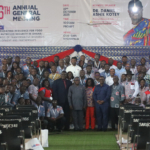
Researchers at the Council for Scientific and Industrial Research (CSIR) are urging the government to provide adequate funding to enable them to develop and deploy science-backed solutions to address illegal mining and its worsening environmental impacts.
In a statement issued after the 36th Annual General Meeting of the CSIR Research Staff Association (RSA) in Nyankpala, the group said the growing devastation caused by galamsey makes it more urgent for the state to resource the institution properly.
According to the researchers, their mandate to generate practical, science-led interventions is being undermined by inadequate funding and limited support from the government.
“There is a call upon the CSIR to intensify research and provide practical solutions to the challenges posed by illegal mining ‘galamsey’ and climate change, which threaten national food security,” the statement said.
The AGM, held at the CSIR–Savanna Agricultural Research Institute (SARI), brought together scientists, policy experts, private sector leaders, farmers and development partners to discuss Ghana’s food and nutrition security challenges. Participants noted that climate shocks, geopolitical disruptions, environmental degradation and socioeconomic vulnerabilities are converging to heighten risks to food production.
Delivering the keynote address, Dr Daniel Ashie Kotey, Director of the CSIR-Plant Genetic Resources Research Institute, called for a bold shift toward resilience-based agricultural research. He argued that the country must embrace transformative, rather than incremental, scientific approaches to withstand climate change, pandemics and global market disruptions.
“Transformative research is disruptive, bold and paradigm-shifting,” he stated, stressing that Ghana’s agri-food systems must be reconfigured to promote productivity, equity and ecological integrity.
The RSA also highlighted critical national challenges, including increasing deforestation, soil infertility, biodiversity loss, and the rapid deterioration of farmlands due to illegal mining. Nutritional issues such as stunting, underweight and widespread food insecurity were also flagged.
Special Guest Ing. Mark Taylor emphasised the need to adopt digital tools and artificial intelligence to strengthen early warning systems, improve crop health monitoring and enhance market access. He urged stronger collaboration between CSIR institutes and the private tech sector to deliver practical digital solutions for farmers.
As part of its resolutions, the RSA appealed directly to the government—under President John Dramani Mahama’s administration—to retool CSIR institutes, invest in infrastructure, strengthen data systems, and empower young scientists to drive innovation.
“We require the government to urgently fund and invest in human resources and infrastructure for transformative research that provides real-world solutions,” the association said, adding that CSIR must be positioned as Ghana’s foremost advisor on research, technology and innovation.
The researchers maintain that without sustained financing and political commitment, the country risks losing the battle against galamsey and compromising its long-term food security.
